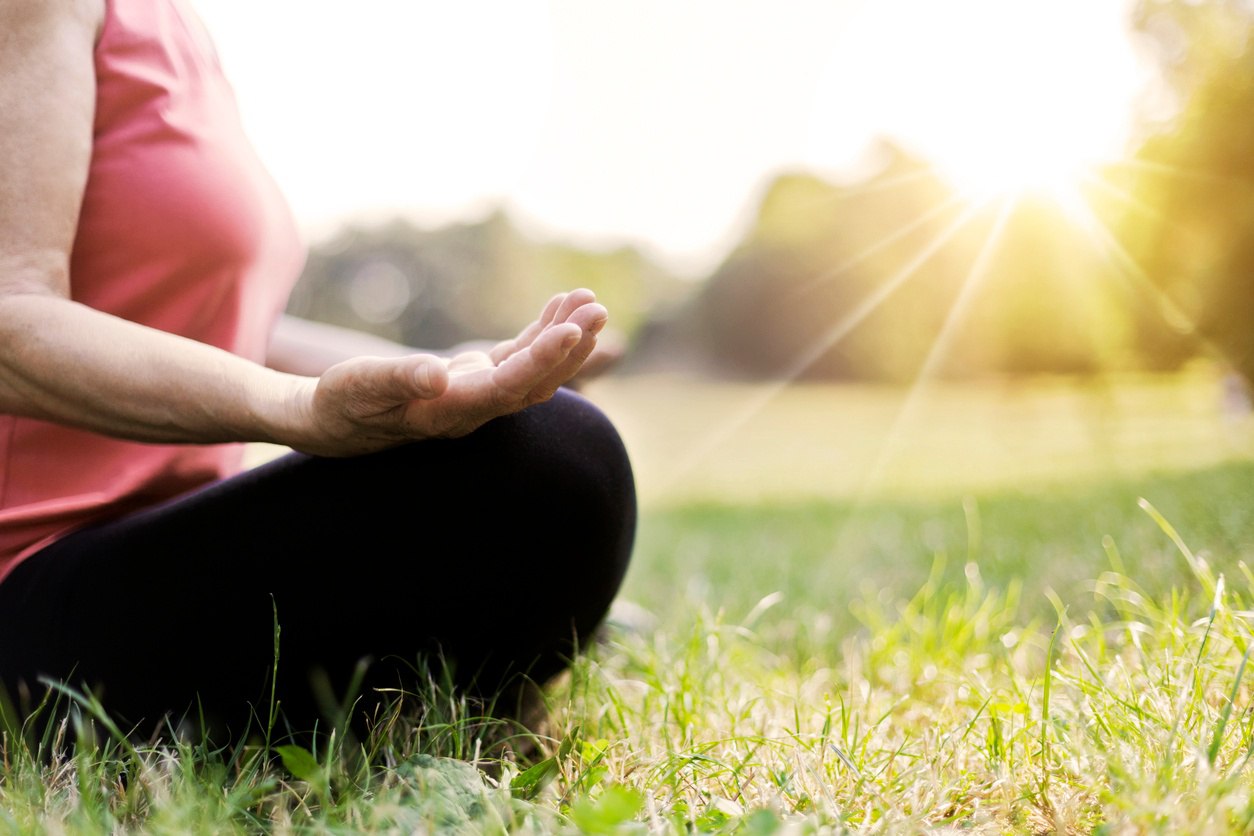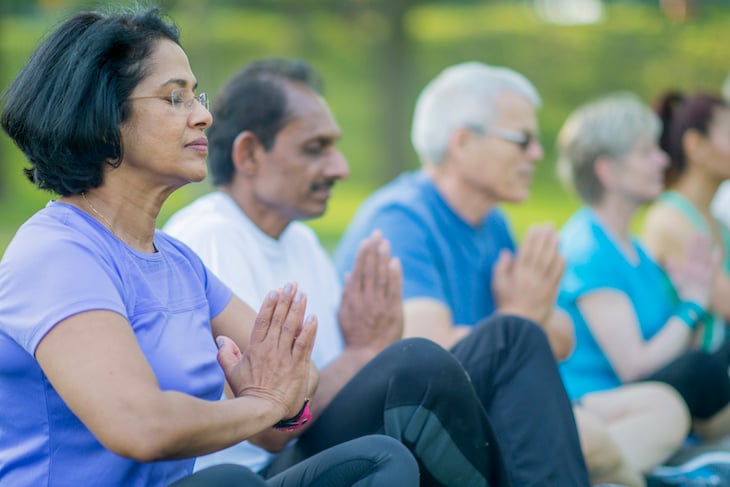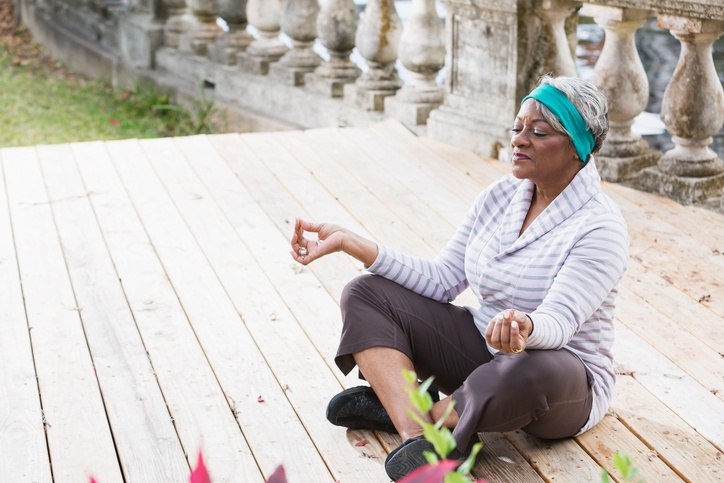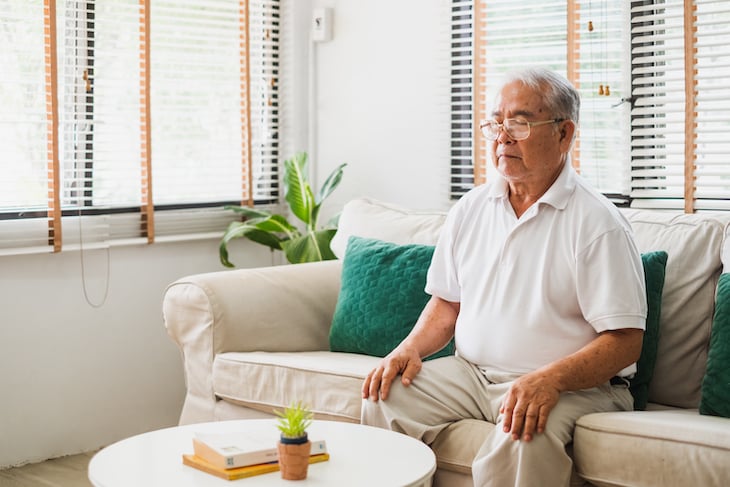
The Benefits of Meditation for Seniors
What is meditation?
Meditation is an extremely ambiguous term that we often hear thrown around frequently in our society. If you ask someone to define meditation, you are bound to get many different answers, but the central concept to take with you is that it's all about finding awareness and perspective through mindfulness.
But, what is mindfulness? When you are practicing mindfulness (which I've found lends itself hand and hand to meditation) you are present, rested in the here and now, and fully engaged in the moment.
When you meditate you want to focus your attention to the processes in your body: observe the speed of your breath, the contact your body is making with the surface you are on, how your rib cage moves with each breath, etc.
As you sit quietly, thoughts will drift through your mind, but the goal of meditation is not to get involved with your thoughts or judge them, but instead to simply be aware of each thought as it comes.
Over time you may see a pattern in your thoughts, and eventually, you will be able to remove the human tendency to judge a thought as good or bad, pleasant or unpleasant. Allowing yourself to have thoughts without any kinds of expectations can significantly reduce stress and anxieties.
How can meditation improve your life?
Many negative symptoms that a person experiences on a daily basis are a result of stress and anxiety. When you are stressed, your brain is less capable of performing its essential daily functions. Stress and anxiety can decrease your ability to retrieve memories, speed up aging processes, decrease digestion performance, and much more.
When you live in a state of stress, your body is continuously stuck in its instinctual fight or flight mode. When this happens, your body focuses less on your daily functioning and is overcome by survival mode.
Although you may not be in any life-threatening situations as our prehistoric ancestors may have been, the stresses of modern-day life can set you into this state. Meditation is one of the best ways to get your body out of the fight or flight mode and allow your body to work to its full capacity.
Meditation allows you to focus on the right now, and gain an awareness of your feelings, sensations and emotions. When you practice meditation, you exercise the hippocampus in your brain, which is largely responsible for processing and retrieving memories.

During meditation, the brain experiences increased blood flow, which in turn leads to a stronger network of blood vessels in the cerebral cortex, according to the Social Cognitive and Affective Neuroscience Journal. This improvement in blood flow to the brain increases density in the hippocampus and produces new neurons, which in turn can enhance various cognitive processes such as emotional regulation, executive control and sustained attention and help improve focus, self-awareness, introspection and compassion.
During meditation, you "flex your memory muscle." Meditation can slow the aging process, tap into subconscious memory stores, stimulate brain regions, and increase focus.
Although many do not associate stress with digestive problems, it is actually one of the number one factors that can cause issues in the gut such as inflammation, acid reflux, ulcers and food allergies.
It is also important to note that many people suffer from stress eating. Reducing your overall stress and anxiety will not only take you out of a constant fight or flight mode that will allow your body to do a better job digesting your food, but you will also reduce the underlying emotions that cause you to stress eat.
In addition to improving many processes inside of your body, reducing stress through meditation also can make a significant difference in the exterior effects of aging. As we age, so does our skin.
In our body, the NF-kB protein (a skin inflammation gene) is responsible for the aging of our skin. In a study by Dr. Howard Chang, it was discovered that by reducing the NF-kB protein, the skin will actually become thicker and more firm.
In 2013, a group of researchers from UCLA discovered that meditation actually turns off the NF-kB protein, which in turn stops the skin from aging and instead improves the overall look and feel of your skin. So in theory, meditation is a really cheap alternative to an expensive anti-wrinkle cream!
The potential benefits of meditation are endless, but here are a few examples:
- Heal faster
- Lose weight
- Boost serotonin and melatonin
- Strengthen immunity
- Increase libido and energy
- Relax nervous system
- Lower respiratory rate
- Better circulation
So, now that I've gotten your attention, how can you start incorporating meditation into your life?
There are many resources available on the internet that can guide you during the beginning stages of learning to meditate. You may not know how to sit and achieve an empty mind, and that's okay—just like anything in life, it takes time and practice.
To begin, you should start by deciding on the type of mediation you would like to practice, as there are many.
Here are a couple of types of mediation:
- Mindfulness meditation
As discussed earlier in this blog, mindfulness is when you are present, rested in the here and now, and fully engaged in the moment. During this practice, you pay attention to your thoughts as they come, but you do not engage with them. You simply notice any patterns in your thoughts. It is often helpful to focus on your bodily sensations during this practice. - Spiritual mediation
During spiritual meditation, you may sit in silence and seek a deeper connection to your God or Universe. This method is similar to prayer and can be practiced either at home or in a place of worship. - Focused meditation
In focused meditation, you concentrate on your five senses. During this practice, you may choose to incorporate external props to help focus your attention. An example of this could be listening to a gong or staring into a candle flame. In this method of meditation, the goal is to remain concentrated on your senses without allowing your mind to wander. - Movement meditation
This form of meditation is reliant on gentle forms of motion, whether it is yoga, walking somewhere quiet, gently swimming, etc. This practice is ideal for those who prefer to find focus through movement. - Mantra meditation
During mantra meditation, you may choose a word or phrase to focus on throughout your practice. The most popular mantra is "Om." When you practice this method of meditation, you repeat a word or series of words either silently or aloud. Mantra meditation is excellent for people who do not like silence and enjoy repetition.
Before you choose your method of meditation, ask yourself some questions:
- Do you find increased focus through movement?
- Does darkness help you relax?
- Do you find sounds calming or distracting?
- Are you trying to focus your mind or empty it?
Discovering the answer to these questions can help guide you in the direction of the method of meditation that is right for you. For example, someone who feels distracted by sounds might want to steer away from mantra meditation.
Meditation is great for everyone, but especially for seniors looking to reduce stress that can affect multiple bodily functions such as memory, focus, digestion, aging, etc. If you do not feel confident trying meditation on your own, here is a great resource to help guide you through your practice. For more information on how to stay healthy during your senior years, download our eBook today!


